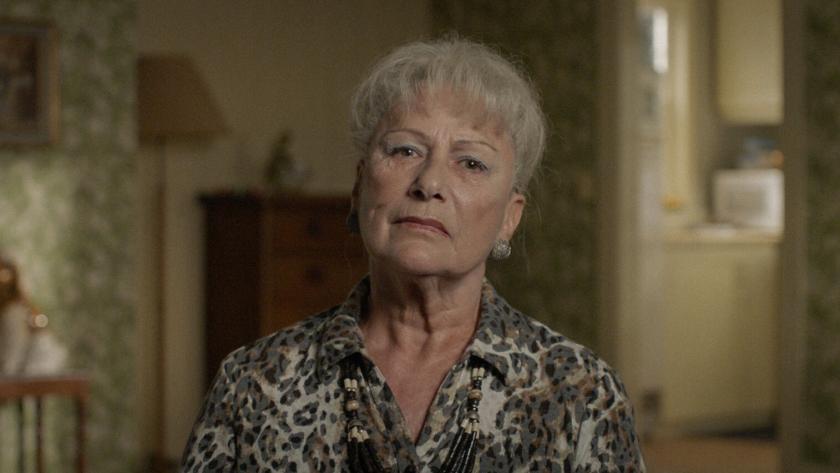It has become so hard to find funding for non-fiction films that many documentary makers now feel compelled to sell their stories as racy detective yarns, larded with dramatic scores and sneakily obfuscating narratives. There’s a piece of deception at the heart of Sam Hobkinson’s Misha and the Wolves which in this age of Holocaust denial, is distressingly slippery.
The film starts out as a portrait of a little Jewish girl, Misha Defonseca, who was hidden with a Belgian family during WWII. Decades later, living in America she tells her synagogue an incredible, heart-rending story of surviving against the odds. When she was seven, Misha recounts, she was so unhappy with her Catholic foster parents that she ran away in search of her real mother and father in Germany. While trekking through the forest, she was adopted by a wolf pack that fed and protected her. From there, she went on to survive many perilous encounters such as sneaking into the Warsaw Ghetto and stabbing dead a German soldier who had raped and killed a woman. All very dramatic.
Misha and the Wolves tells this story with great style; it’s replete with beautifully framed and lit interviews. There’s the woman, Jane Daniel, who befriended her and published her memoir, Surviving with Wolves in 1997. There’s Joni Saffron, who ran the nearby wolf sanctuary in Massachusetts who testifies to Misha’s special connection with the creatures. Hobkinson interviews friends and neighbours, Holocaust historians, genealogists and journalists. To alleviate the talking heads there are reconstructions of her childhood in the forest, familiar newsreels from WWII and interwoven throughout Misha’s media appearances – she became quite the star on the chat show circuit in the US and Europe. A French filmmaker turned her ordeal into a dramatic feature film in 2007. There’s just one big problem. Misha’s incredible story wasn’t true. There were doubts when her book was first published and she confessed to it being fraudulent in 2008 after the French feature provoked a new wave of suspicion. Extensively reported in the media at the time, its author apologised for passing off her fantasy as real, repaid her royalties and has been living reclusively ever since. But Misha and the Wolves chooses not to refer to the media coverage in order perhaps to make the film seem more ground-breaking or for sheer dramatic effect. Indeed, laced throughout the documentary is an interview with a woman who is presented as the survivor herself, telling her own life story.
There’s just one big problem. Misha’s incredible story wasn’t true. There were doubts when her book was first published and she confessed to it being fraudulent in 2008 after the French feature provoked a new wave of suspicion. Extensively reported in the media at the time, its author apologised for passing off her fantasy as real, repaid her royalties and has been living reclusively ever since. But Misha and the Wolves chooses not to refer to the media coverage in order perhaps to make the film seem more ground-breaking or for sheer dramatic effect. Indeed, laced throughout the documentary is an interview with a woman who is presented as the survivor herself, telling her own life story.
At a key moment late in his film, Hobkinson serves up a coup de théâtre: a wig is ripped off to reveal that this is not the real Misha but an actor. The set is deconstructed and the show is over. While there’s nothing inherently dishonest in using an actor to speak the words of an actual person – just last year, Coup 53 had Ralph Fiennes portray the M16 spy (a key figure in the 1950s Iranian coup) to create on screen an interview that was never filmed. But that documentary made it clear all along that Fiennes was acting a part. Misha and the Wolves does not. It chooses to mislead the audience for a long time in the interest of making the story more exciting.
Did Hobkinson need to tart up Misha’s story? Over the decades there have been numerous instances of people claiming falsely to be Holocaust child survivors (Rosemarie Pence, Moshe Peter Loth, Rosemarie Koczy, Binjamin Wilkomirski). One could make a fascinating documentary about these delusional claimants, including Misha, and what prompts their lies – mental illness, financial gain, a desire to be loved as a victim, or a desperate craving for fame. One could make an equally fascinating documentary about why the public is so eager to eat up a story as wild as Misha’s. Do these tales of survival give us hope? Do they take our minds off the millions who were killed (no friendly wolves)? Sadly Misha and the Wolves is not that film.















Add comment